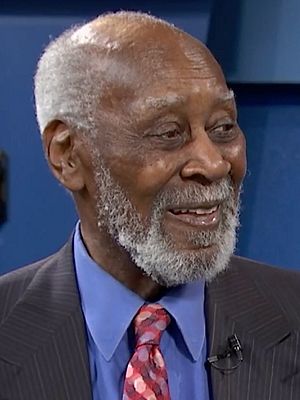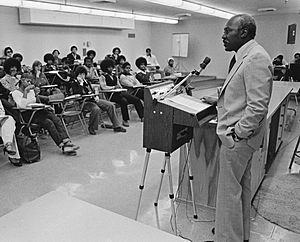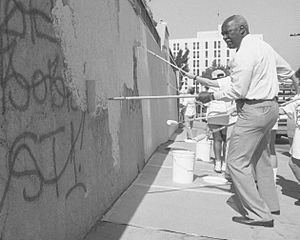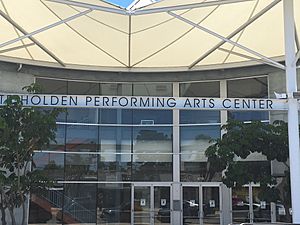Nate Holden facts for kids
Quick facts for kids
Nate Holden
|
|
|---|---|

Holden in 2020
|
|
| Member of the Los Angeles City Council from the 10th district | |
| In office July 1, 1987 – June 30, 2003 |
|
| Preceded by | David Cunningham |
| Succeeded by | Martin Ludlow |
| Member of the California Senate from the 30th district |
|
| In office December 2, 1974 – November 30, 1978 |
|
| Preceded by | Lawrence E. Walsh |
| Succeeded by | Diane Watson |
| Personal details | |
| Born | June 19, 1929 Macon, Georgia, U.S. |
| Died | May 7, 2025 (aged 95) Santa Monica, California, U.S. |
| Political party | Democratic |
| Children | Reggie and Chris |
| Military service | |
| Branch | |
| Unit | Military Police |
Nathan Nathaniel Holden (born June 19, 1929 – died May 7, 2025) was an American politician from Los Angeles County. He worked for the people of California for many years. He served four years in the California State Senate and 16 years on the Los Angeles City Council.
Contents
Nate Holden's Life and Career
Early Life and Education
Nathan Nathaniel Holden was born in Macon, Georgia, on June 19, 1929. His father worked for the railroad. When Nate was 10, he moved with his mother and brothers to Elizabeth, New Jersey.
He left high school at 16 to join the U.S. Army. There, he became a military policeman. After his time in the Army, he finished high school by going to night classes. Later, he studied design and engineering in the evenings at West Coast University.
Working Life and Family
Nate Holden first worked for Bell Laboratories in New Jersey. In 1955, he moved to California. He then worked as an aerospace engineer.
He had two sons. One son, Chris Holden, became a California State Assemblymember. His other son, Reginald Holden, worked as a Deputy Sheriff in Los Angeles County. Nate Holden passed away in Santa Monica, California, on May 7, 2025, at 95 years old.
About Nate Holden
As a teenager, Nate Holden was an amateur boxer. He was known for being tall and dignified. Even when he was in his sixties, he completed the Los Angeles Marathon twice, in 1990 and 1991.
People often saw two sides to his personality. He could be kind and understanding. But he also showed a tough side, especially when talking about challenges he faced in politics. A fellow councilman, John Ferraro, once said that even though Holden could be "gruff and rough," he had a "big heart."
Nate Holden's Political Journey
Starting in Politics
In California, Nate Holden became very involved in the Democratic Party. He was part of a group working for peace. He also led a local Democratic Club.
His first attempt to win a public office was in 1968. He ran for a seat in the U.S. Congress but did not win. In 1970, he became president of the California Democratic Council. That same year, he ran for Congress two more times.
Serving in the State Senate
Nate Holden started his work as a state senator in 1974. He served for four years. After that, he left his position to try and win a seat in Congress. However, he was not successful in that election.
Working on the City Council
Nate Holden served on the Los Angeles City Council for 16 years. During his time, he supported a plan to develop the site of the Ambassador Hotel in Los Angeles.
In 1990, Holden was on a helicopter with Donald Trump that had a close call. Years later, in 2024, this incident was mentioned again. Nate Holden confirmed that no one on that flight discussed Kamala Harris, which was a detail that had been incorrectly added to the story by others.
Council Elections
- 1987: Nate Holden ran for the 10th District seat on the Los Angeles City Council. He won by a large margin.
- 1989: Holden ran for mayor against the current mayor, Tom Bradley. He supported a plan to divide the Los Angeles Unified School District. He did not win the mayoral election.
- 1991: A former schoolteacher challenged Holden for his council seat. She won a surprising number of votes. This was partly because some people were unhappy with Holden's stance on the Police Chief at the time.
- 1995: Holden faced two strong challengers in this election. In the final vote, he won with 54% of the votes and was re-elected.
Important Laws and Rules
- 1987: Holden helped pass a law that stopped the sale or making of toy guns that looked too real.
- 1990: He proposed a rule requiring people who bought Rolex watches to register their serial numbers with the police. This was to make it harder for criminals to sell stolen watches.
- 1999: Holden worked on a law to make cable companies remove sneakers that were tied together and left hanging from overhead lines. He believed these were signs of gang activity. Police thought they were mostly pranks. This bill also passed.
Nate Holden's Legacy
- The Nate Holden Performing Arts Center in Los Angeles is named in his honor.
- He helped change rules that made it hard for women to get a mortgage without a man's signature.
- He wrote the law that led California to be the first state to recognize the Martin Luther King Jr. holiday.
 | George Robert Carruthers |
 | Patricia Bath |
 | Jan Ernst Matzeliger |
 | Alexander Miles |




